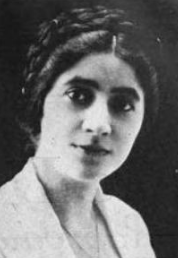Julia Veronica Grilli (March 14, 1893 – December 6, 1991), also seen as Giulia Grilli, was an American lawyer and concert singer.
Early life
editJulia Veronica Grilli was born in New York, the daughter of Nicola Grilli and Rosina (Rose) Trippitelli Grilli. Her parents were immigrants from Sulmona in Abruzzo.[1] Her father was a columnist in Italian-language newspapers.[2][3] She graduated from Brooklyn Law School in 1914. She trained as a singer in New York, with Alfredo Martino and Albert Wolff.[4]
Career
editLaw
editGrilli passed the New York bar examination in 1914, and opened her own practice as a trial lawyer[5] in the Wall Street district. She was a suffragist, and advocated jury service for women.[6] She served as legal counsel for the Italian Welfare League and the Italian Hospital. She was one of the founders of the Brooklyn Women Lawyers Association.[4][7] In 1921, she was promoted by the Women's Democratic Club as a candidate for judge.[1]
Music
editGrilli, a mezzo-soprano[8] or contralto,[9] and became familiar to New York audiences during World War I, when she sang at concerts to benefit causes in the Italian-American community.[10] She gave a professional recital in New York's Aeolian Hall in 1921, accompanied by Albert Wolff.[11] Commenting on coverage of her as a lawyer turned singer, she exclaimed, "I have never been able to discover... whether it is considered strange that a singer should be a lawyer, or that a lawyer should sing!" She was active in the Italian Music League.[12]
Personal life
editIn 1928, Grilli married Romolo Angelone (1897–1991), who was also from Sulmona, and worked at the Italian embassy.[13] The Italian ambassador to the United States served as best man at their wedding.[14] She had a son, Luigi Paolo (Louis), and a daughter, Elisabeth. Romolo Angelone became Italy's commercial attaché in Shanghai and Tokyo during World War II. Julia Grilli Angelone died in West Palm Beach, Florida, in 1991, aged 98 years.[15]
References
edit- ^ a b Aleandri, Emelise (2002). Little Italy. Arcadia Publishing. p. 40. ISBN 978-0-7385-1062-0.
- ^ "Nicola Grilli Dead; News Paper Writer". The New York Times. December 5, 1935. p. 25 – via ProQuest.
- ^ "Nicoli Grilli Dead; Banker and Editor". The Brooklyn Daily Eagle. 1935-12-04. p. 15. Retrieved 2020-07-09 – via Newspapers.com.
- ^ a b de Valdor, Joseph (March 11, 1921). "Giulia Grilli to Appear in Recital". Music News. 13: 22.
- ^ Patterson, Ada (1918-12-03). "The New Triumph of Women Lawyers". The Wilmington Morning Star. p. 8. Retrieved 2020-07-09 – via Newspapers.com.
- ^ Perry, Elisabeth Israels (2019-03-06). After the Vote: Feminist Politics in La Guardia's New York. Oxford University Press. p. 76. ISBN 978-0-19-934185-6.
- ^ "Women Lawyers Hear Jurists". Times Union. 1918-03-22. p. 8. Retrieved 2020-07-09 – via Newspapers.com.
- ^ "How Giulia Grilli Doffed Portia Robes for Career as a Singer". Musical America. 34: 17. June 11, 1921.
- ^ "Manual High Gives Concert". Times Union. 1921-06-11. p. 12. Retrieved 2020-07-09 – via Newspapers.com.
- ^ "Martinelli and Yon Brothers in Concerts". Musical Courier. 77: 47. October 11, 1918.
- ^ de Valdor, Joseph (March 23, 1921). "Giulia Grilli's Debut". Music News. 13: 22.
- ^ "Stracciari is Lion of Italian Concert". Musical America. 34: 37. May 14, 1921.
- ^ "Sails on Honeymoon". The Brooklyn Daily Eagle. 1928-07-18. p. 5. Retrieved 2020-07-09 – via Newspapers.com.
- ^ "JULIA GRILLI BECOMES BRIDE HERE TOMORROW; Lawyer to Wed Romolo Angelone of Italian Embassy--De Martino Best Man". The New York Times. 1928-07-11. ISSN 0362-4331. Retrieved 2020-07-09.
- ^ "Julia Grilli Angelone". The Palm Beach Post. 1991-12-08. p. 74. Retrieved 2020-07-09 – via Newspapers.com.
